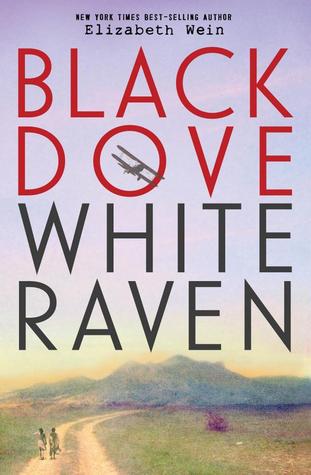95% of my reading is for pleasure and 5% is for obligation. I also enjoy learning while I am reading so that is why I am drawn to historical fiction, biography and history books. Sometimes there will be a book that is available for me to read or listen to and I'm not too excited but I think that it might make me a broader reader or more intelligent so I plod on. In cases like this however, if I am not enjoying it after giving it a reasonable chance I put that book right down and say adieu to the characters. In a way I love giving up on books. I'm reading for pleasure, not uni or to be payed so I'm not going to suffer through a book I dislike.
The last book I didn't finish was "Black Dove, White Raven" by Elizabeth Wein. This was a surprise. I have read two other books by the author and really enjoyed them both and now I'm reading her third book and can't get past the first 50 pages! I was listening to this at school and I had an hour after school just to twiddle my thumbs before a concert. The perfect time to listen to a book and do some theory or Hanon practice but I just couldn't bring myself to continue with the book because aspects of it were too frustrating to me.
One of these frustrations was the intelligence age of one of the- at that time 8 year old- main characters Teo. My life revolves around 8 year old boys, I think I have a pretty good grasp on their maturity level and their use of language. 8 year old boys do not use fancy language or metaphors! In this book Teo kept on coming up with these pearls of wisdom and sentences all connected by these great metaphors.
The boys I know at the age of 8 are clever, hilarious people but they like to talk about the games they play, how the chair they are sitting on makes a funny noise and that they can run faster than anyone else. One of my grade 3 cello classes delight in singing LOUDLY "Pin, Pong, Peddle!" to the tune of Hot Cross Buns. Who knows why? this to the them is the height of wit and and they could sing it for hours.
In this novel Teo soliloquies for a paragraph on how his step mother's depression was like the handle of a pitcher which had been broken off and even if it were to be repaired it would still have the marks of the break on it. Maybe I mix with the wrong 8 year olds but I can't imagine any of them coming up with that without some serious nudging,
Another frustration was that the story was structured around an unrealistic idea. The novel begins when Teo and Emilia are in their late teens and living in war torn Ethiopia around the beginning of World War Two. The first chapter lets the reader know that Teo for some reason is in custody and Emilia is doing her best to get him released. Emilia decides to petition right to the head of state in Ethiopia by writing him a letter or you could say, a book. In fact the very book we are reading. She feels that giving the Ethiopian head of state an intimate look into Teo's life from age 5 where she recounts anecdotes and descriptions of minor characters he will come to realise Teo's innocence and need for freedom. Adding to craziness of this, Emilia mentions in her opening that she is writing in a language that the head of state cannot read so he will need to have his translators translate it for him which Emilia acknowledges may be tricky since they are in the middle of a war.
This 'hail mary' plea bargain just seemed too far fetched to me. I found it difficult to lose myself in the book as I kept on reminding myself that the official translators are supposedly translating this description of Teo ad Emilia's school life because some how it is of as much importance as the gun fire outside.
I was disappointed that I didn't enjoy this book, I really wanted to but overall I felt like this book was trying hard to be beautiful and deep but trying so hard it was noticeable and unnatural. If you want to read a book by Elizabeth Wein I recommend "Rose Under Fire" and "Code Name Verity" but give this one a miss.
